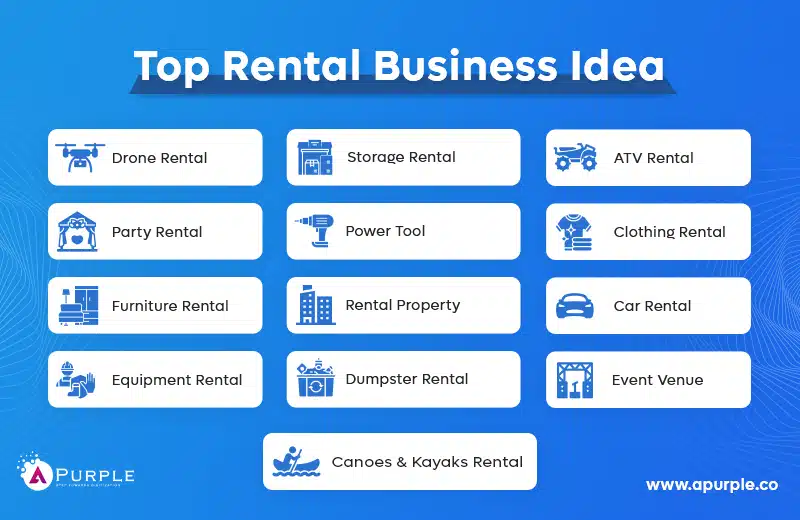
Imagine earning six figures by renting gear that people need temporarily—baby equipment, drones, RVs, cameras, even smart home devices. The rental economy is experiencing unprecedented growth, with the global sharing economy projected to reach around $1.4 Trillion by 2030.
Whether you want a small rental business idea or the most profitable rental business, this guide explores 13 proven and “unique” rental business opportunities, complete with startup costs, profit margins, and ROI projections based on current market data.
13 Top Rental Business Ideas For Small Businesses
1. Drone Rental
A drone rental business offers the chance to rent top-notch drones for different purposes, including aerial photography, videography, surveying, inspection, and more.
The US drone services market is expected to grow at a compound annual growth rate (CAGR) of 36.78% annually from 2026 to 2034. This business model enables individuals and companies to use advanced drone technology without a considerable upfront investment in purchasing the equipment.
Places where Drones are used –
- Infrastructure: AI‑assisted inspections with real-time anomaly detection
- Agriculture: Autonomous crop monitoring with predictive analytics
- Delivery: lightweight last‑mile package transport, part of a $10 bn+ global market
- Filming: high-res LiDAR and cinematic shoots
- Public safety & SAR: BVLOS-enabled search operations
- Events & tourism: immersive aerial footage for live events
Target buyer for a Drone Rental Business
- Construction, energy & telecom firms needing AI-enhanced inspection data
- Agritech operators leveraging predictive crop insights
- E-commerce, healthcare & food businesses piloting delivery drone tests
- Film/video producers requiring LiDAR shortcuts and cinematic aerials
- Gov/public safety agencies deploying BVLOS search & rescue or traffic surveillance.
How do Drone Rental Businesses Make Money?
- Tiered rental structure: hourly for hobbyists, daily for events, and subscription/B2B models for companies looking for ongoing access. Higher rates apply to drones with AI capabilities or extended BVLOS compliance.
- Additional services: Upsell AI inspection packages (e.g. thermal anomaly reports), remote‑piloting/BVLOS operations, and LiDAR/topographic mapping turnkey deliverables.
- Accessories sales: Include AI‑ready sensors, ND filters, docking stations for unattended BVLOS operations—plus annual software update plans.
- Maintenance and repair services: Provide predictive maintenance powered by LLM analytics (e.g. usage + sensor log analysis), plus compliance documentation (e.g. UTM/FAA reports).
- Subscription fee: Offer enterprise subscriptions: monthly drone fleet access, UTM integration, data analytics dashboards, and priority support for corporate or municipal clients.
2. Storage Rentals (Still Booming in 2026)
With rising housing costs, remote work flexibility, and urban downsizing, self-storage rentals continue to be one of the most profitable rental business ideas in the Globe. According to IBISWorld and supporting industry research, the US self-storage market is projected to reach approximately $57.5 billion by 2030, driven by demand from both individual and commercial users.
Entrepreneurs can tap into this growing industry by offering flexible storage unit sizes (from climate-controlled mini lockers to large warehouse spaces) and modern digital features like app-based access, contactless rentals, and real-time availability tracking.
Target buyer for a Storage Rentals Business
- Urban dwellers and renters in compact apartments with limited space
- Remote workers and digital nomads storing office or personal items between moves
- College students needing semester-break storage
- Small eCommerce brands using units for inventory or fulfillment
- Construction companies or contractors storing tools and materials off-site
Monetization Opportunities in Storage Rental
- Recurring rental fees: weekly, monthly, or annual plans
- Add-on services: You can offer insurance, packaging materials, smart locks, truck rentals for moving, packing, and even AI-powered inventory tracking. Premium storage options, like climate-controlled units and 24/7 secure access.
Read also: Small business idea for entrepreneurs
3. ATV(All-Terrain Vehicles) Rentals
The global ATV market is projected to reach $5.2 billion by 2027, driven by recreational demand and rural utility usage. Renting ATVs is an excellent niche for regions with trails, ranches, forests, or outdoor parks.
Types of rentable ATVs include utility, sport, touring, and youth models. You can also expand your offerings with dirt bikes or UTVs (Utility Task Vehicles).
Target buyer for a Furniture Rental Startup Business
- Outdoor enthusiasts and adventure seekers who enjoy exploring off-road terrain, such as trails, dunes, and forests
- Farmers, ranchers, and landowners who require a versatile vehicle for various agricultural and land management tasks
- Hunters and anglers who need to access remote locations and transport equipment
- Families and individuals looking for a thrilling recreational activity to enjoy together.
How do Party Rental Businesses Make Money?
- Rental fees: Hourly or day-based ATV rentals
- Accessory sales: Offer additional equipment and gear, such as helmets, goggles, and protective clothing, for customers to purchase or rent.
- Tour packages: At a higher price point, provide guided ATV tours and excursions, which can include transportation, trail access, and other amenities.
- Maintenance and repair services: Providing maintenance and repair services for ATVs.
4. Party Rental Business
The event rental market is expected to exceed $25 billion, with projections indicating further growth to approximately $37.5 billion by 2030, driven by rising demand for DIY parties, Instagrammable setups, and corporate retreats.
Focus on a specific niche—luxury wedding setups, birthday inflatables, rustic décor, or corporate lounge furniture—to reduce competition and boost margins.
Target buyer for a Party Rental Business
- Millennials planning weddings or gender reveals
- Corporates organizing offsite events and retreats
- Parents hosting birthday parties and school events
- Influencers and event planners
How do Party Rental Businesses Make Money?
The revenue model for a party rental services business can be based on:
- Rental fees: You can charge users for party equipment, such as bouncing houses, karaoke machines, or other specialized items.
- Delivery and setup fees: You can offer delivery and setup services for the rented equipment, generating additional revenue.
- Add-on services: For an additional fee, you can provide eco-friendly disposable products or themed kits or other value-added services.
5. Power Tool Rentals
The tool rental market is projected to grow at a CAGR of 4.2% from 2026 to 2033 . This growth is driven by increasing demand from various industries including construction, landscaping, and DIY projects, along with the affordability and flexibility benefits of renting over buying.
Tools can include drills, saws, jackhammers, nail guns, pressure washers, and tile cutters—cater to both DIYers and commercial contractors.
Target buyer for a Power Tool Rental Business
- Those undertaking home renovation projects, repairs, or occasional tasks will rent such power tools.
- Small contractors, handymen, and builders often require various power tools for different projects.
- Companies involved in maintenance, landscaping, or facility management
How do Power Tool Businesses Make Money?
- Rental fees: Charge rental fees for each power tool daily, weekly, or monthly.
- Delivery and pickup fees: Offer delivery and pickup services for an additional cost.
- Sales of consumables and accessories: Sell consumable items like sandpaper, blades, and other tool accessories.
- Maintenance and repair services: Offer maintenance and repair services for power tools and rental businesses to generate income from customers who own their tools.
6. Clothing Rental Business (Sustainable + Smart)
The global online clothing rental market is projected to grow at a CAGR of 14.2% from 2026 to 2033, reaching around $7.8 billion by 2033, fueled by growing sustainability awareness and demand for occasional-wear rentals.
https://www.databridgemarketresearch.com/reports/global-online-clothing-rental-market
Tap into trending niches like maternity wear, vintage fashion, cultural attire, and plus-size or occasion-specific wardrobes.
Target buyer for a Clothing Rental
- Fashion-forward Gen Z & Millennials
- Influencers, wedding guests, or prom-goers
- Cosplayers, performers, and themed event attendees
How do Clothing Rental Businesses Make Money?
- Rental fees — You can charge users for a variety of garment categories, such as grand garments for special occasions, costumes for events or parties, formal clothing, quirky costumes, dry cleaning and late-return charges and vintage collections.
- Accessory rental services – You can change for additional accessories, including watches, jewelry, glasses, belts, etc.
Read also: Fashion App Development – Build your Own Mobile App
7. Canoes and Kayaks Rentals
Establishing a canoe and kayak rental business can be profitable with relatively low initial investment requirements. If you enjoy spending time on the water occasionally and prefer not to own a boat, renting canoes and kayaks is convenient and cost-effective for exploring nearby waterways.
Yacht ownership and rental also present a lucrative business opportunity. However, before venturing into this field, obtaining all the required permits, licenses, and insurance is essential to ensure future safety and compliance.
Target buyer for a Canoe and Kayak Rental Business
- Outdoor enthusiasts are looking to enjoy water-based activities without the commitment of boat ownership.
- Tourists and vacationers seeking recreational water experiences during their travels
- Event planners organize team-building activities, group outings, or special occasions on the water.
How do Canoe and Kayaks Rental Businesses Make Money?
- Rental fees: You can charge customers for using canoes, kayaks, or yachts on an hourly, daily, or weekly basis.
- Guided tours: You can offer guided water tours or excursions as premium experiences for an additional fee.
- Equipment sales and accessories: You can sell related gear, paddles, safety equipment, or merchandise to complement the rental experience.
8. Furniture Rental Business
The global furniture rental market is expected to grow at a CAGR of 7.1% from 2026 to 2033, driven by rising mobility, short-term housing trends, and the shift to hybrid workspaces.
This business is ideal for entrepreneurs looking to cater to students, professionals relocating, or businesses seeking flexible office setups. Offer subscription-based packages for individuals or businesses, including furniture swaps or seasonal upgrades.
Target buyer for a Furniture Rental Business
- Students moving into dorms or flats who need temporary
- Corporate employees or digital nomads relocating for short-term projects or contracts
- Startups and coworking offices that prefer flexible, scalable furnishing solutions
- Interior designers or home stagers who need access to temporary pieces for client shoots
How do Furniture Rental Businesses Make Money?
- Rental fees: You can charge customers for the temporary use of furniture pieces, such as sofas, tables, chairs, and beds
- Delivery and installation fees: You can offer additional services for delivering and and installation of rented furniture, generating extra revenue.
- Add-ons: You can offer personalized furniture packages or add-on services for a fee to cater to specific customer preferences.
9. Rental Property Business
The global vacation rental market is forecasted to reach approximately $138.6 billion by 2032, driven by increasing demand for affordable and flexible accommodations, the rise of experiential travel, and the expansion of digital booking platforms.
Consider long-term rentals, Airbnb-style short stays, or niche options like eco-lodges, glamping pods, or event venue spaces. Digitize bookings, automate check-ins, and offer premium add-ons to boost returns.
Key Customers for a Rental Property Businesss
- ravelers and tourists looking for short-term rentals such as apartments, vacation homes, or boutique cabins.
- Remote workers or digital nomads who prefer longer, comfortable stays with work-friendly amenities like high-speed Wi-Fi and desk setups
- Corporates and startups searching for commercial space or temporary accommodation for relocated employees.
How do Rental Property Businesses Make Money?
- Rental fees: Charge rental fees (daily, weekly, or monthly) for different property categories.
- Platform fees: Earn revenue through transaction fees, subscription models, or other monetization strategies
- Additional services: Offer value-added services such as property management, cleaning, maintenance, or event planning, which can create additional revenue streams.
Read also: Vacation Rental App Development Cost – Everything You Need to Know
10. Equipment Rental Business
The equipment rental market is projected to cross $280 billion by 2030, as companies increasingly shift from ownership to leasing models for tools ranging from construction equipment to AV gear.
Start small by renting out power tools, generators, medical devices, or lighting systems for weddings. Or expand into heavy machinery, commercial HVAC, or mobile staging platforms depending on demand in your region.
Target buyer for an Equipment Rental Business
- Contractors and construction firms needing short-term access to expensive tools or heavy machinery for site-based projects
- Event planners and production agencies requiring AV gear, lighting, or staging for concerts, weddings, and corporate expos.
- Facility managers and schools needing temporary access to cleaning machines, lifts, or safety tools.
- Healthcare providers or clinics looking to rent diagnostic machines or mobility tools without the cost of buying.
How do Equipment Rental Businesses Make Money?
- Rental fees: Charge daily, weekly, or project-based rental fees based on usage hours or machine type.
- Delivery and setup fees: Add delivery, installation, and removal costs depending on the equipment.
- Damage waiver fees: Offer equipment protection plans, damage waivers, and deposits for high-ticket items
- Sign corporate retainers: conenct with companies who require monthly access to tools or machines.
11. Dumpster Rental Business
With increasing focus on eco-conscious cleanups and sustainable construction, the dumpster rental business is more relevant than ever. The market for waste disposal services was set to grow beyond $82 billion by 2026, and is projected to continue expanding at a CAGR of 7% from 2026 to 2033, reaching approximately $126 billion by 2033.
Entrepreneurs can tap into both residential and commercial waste needs by offering digital scheduling, real-time tracking, and green disposal partnerships.
Key Customers for Dumpster Rental Services
- Homeowners undergoing renovations or decluttering large spaces during moves or estate cleanouts.
- Contractors and construction firms managing waste at job sites or post-demolition.
- Commercial property managers and retail chains organizing periodic cleanouts or sustainability upgrades.
- Event organizers hosting festivals, expos, or large gatherings that require temporary on-site waste management.
How do Dumpster Rental Businesses Make Money?
- Dumpster rental fees: You can charge clients a daily, weekly or monthly rate for using the dumpsters.
- Disposal fees: Include disposal and recycling charges, where you earn margin from tipping fees.
- Specialized services: Provide consultation services for large cleanout planning or LEED-compliant waste sorting. Upsell with smart bin tracking or apps that allow clients to schedule pickups via mobile.
You May Also Like: How to Start a Dump Truck Business – 100% Tested Checklist
12. Event Venue Rental
Event venue rentals are in high demand, especially for micro-weddings, hybrid conferences, and influencer events. The venue rental industry is growing steadily and is expected to reach approximately $28 billion by 2032.
Venues with flexible layouts, built-in A/V systems, and virtual event options are becoming the standard. Listing on platforms like Peerspace, Splacer, or a custom website helps maximize bookings.
Target buyer for an Event Venue Rental Business
- Corporate clients hosting product launches, workshops, and networking mixers that need flexible layouts and connectivity.
- Couples or families planning weddings, anniversaries, or milestone celebrations with customizable decor options.
- Community groups, artists, and educators looking for space to run classes, performances, or spiritual gatherings.
- Agencies and influencers needing pop-up locations or Instagram-worthy backdrops for content creation.
How does Event Venue Rental Make Money?
- Venue rental Fees: The primary source of income is the rental fees charged for using the event spaces, which can vary based on factors such as size, location, amenities, and peak/off-peak seasons.
- Additional services: Charge for complementary services, such as event planning, catering, bartending, equipment rentals, and audio-visual support, can provide additional revenue streams.
- Subscription fees: Some event venue rental businesses may offer membership or subscription programs in which clients pay a recurring payment to access exclusive event spaces.
13. Car Rental Business
The car rental market is expected to grow significantly, reaching approximately $347.2 billion by 2032, driven by rapid urbanization, increasing tourism, the adoption of EVs, peer-to-peer models, and app-based rentals.
Offer hourly, daily, or long-term rentals, and expand into niche categories such as luxury cars, ride-hailing driver rentals, or Turo-style platforms. If you’re looking to enter this industry, you can start a Car Rental Business with careful planning and strategic choices.
Target buyer for a Car Rental startup Business
- Travelers and tourists who need flexible mobility without using taxis or ride-hailing apps
- Business professionals or digital nomads in new cities needing a reliable short-term vehicle
- Car owners whose vehicles are in repair or unavailable, needing temporary replacements
- Rideshare drivers and gig workers looking for rented cars to use for Uber, Lyft, or delivery apps
How do Car Rental startup Business Businesses Make Money?
- Rental fees: You can charge customers daily or weekly rental fees for the use of the cars.
- Ancillary fees: Earn additional revenue from fees like late returns, fuel refill charges, and one-way rentals.
- Vehicle resale: Rental companies will eventually sell off their fleet of vehicles, often at a profit, to make way for newer models.
Read also: Taxi App Development – a Complete Guide
Wrapping it Up
Whether you’re drawn to niche rental models like tech gadgets or traditional categories like property or party supplies — every profitable rental business begins with strategic planning, accurate budgeting, and seamless digitization.
The rental economy continues to grow, driven by consumer demand for access over ownership, sustainability trends, and startup innovation. By combining your rental idea with a custom app or rental platform, you not only improve operational efficiency but also elevate user experience — which is key to standing out in this competitive space.
Ready to turn your rental business idea into a scalable, revenue-generating platform? Let’s build your digital foundation with our Rental App Development Services.
Connect With Our Experts Now to explore features, pricing models, monetization strategies, and time-to-market plans.




